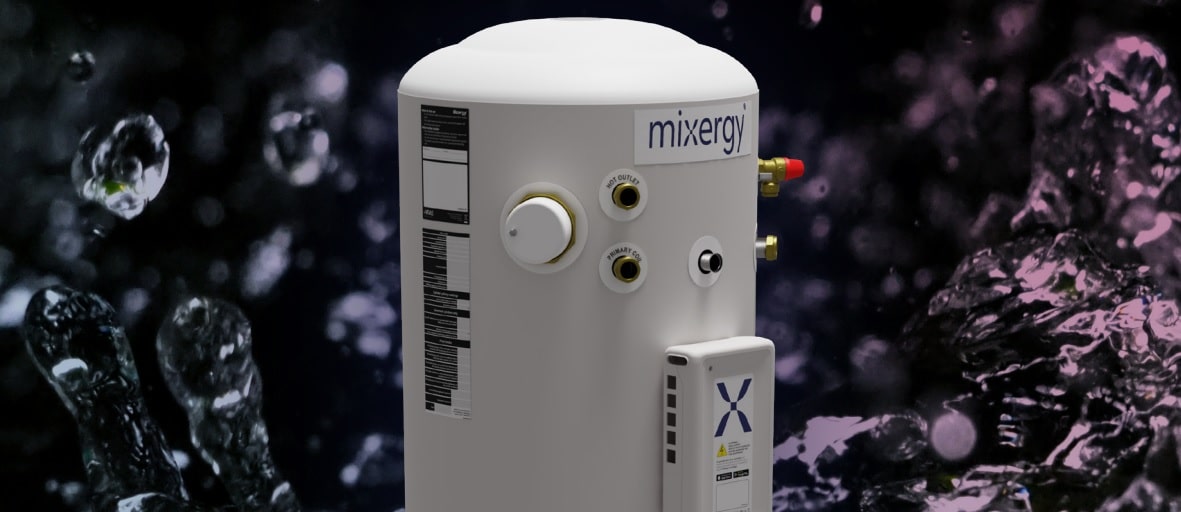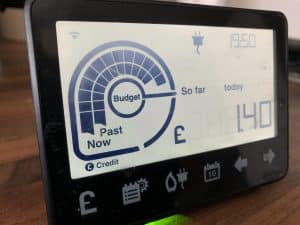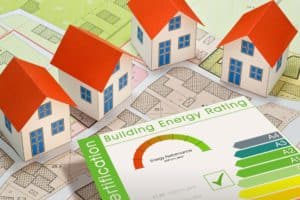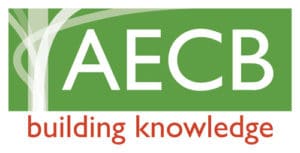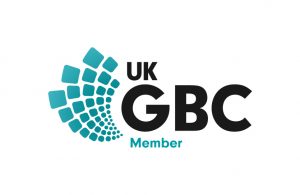Read our latest guest post with James from Mixergy, market leader in hot water tank innovation.
Created back in 2015, Mixergy are the makers of The Mixology Tank – an exciting, modern and innovative product which is re-thinking how hot water is done, using technology to find cost-effective and convenient solutions which help people live more sustainably.
In our books, they are pretty exceptional; and so, we were delighted when James put together this insightful blog article all about Mixology and its crucial role in existing home EPC uplifts.
‘An existing home EPC uplift has just become affordable using Mixergy’s Appendix Q benefit in SAP. Improve EPC and reduce carbon using this revolutionary hot water cylinder.’
COP26 is over and social housing providers are looking for ways to become Net-Zero faster.
But what should be done for existing housing stock to remove gas and oil boilers and replace them with heat pumps? How will the Government’s Clean Growth Strategy of an EPC of C by 2030, be met?
The ugly truth is that Net-Zero is a future target for 2050 based on the decarbonisation of electricity generation and – as a country – we need to start decarbonisation now based on technologies that are future-proof.
Let us look at electricity generation today. At the time of this article, 41.4 GW of electricity is on the grid with a carbon intensity of 274 gCO2/KWh with over 50% still being generated from natural gas which has a carbon intensity of 250 gCO2/KWh. Based on our current technology and capacity for renewable electricity generation, a mass switch over from gas boilers to heat pumps for home heating will have a positive impact on home EPC ratings but the carbon saved in the home is moved onto power generation. This isn’t reducing our carbon emissions now; it is kicking it down the road to Net-Zero.
It is clear that the electrification of the grid through accelerated deployment of renewables combined with heat pumps will lower the carbon impact of millions of homes in the future. However, there is a huge opportunity to accelerate decarbonisation today in existing homes with readily available technologies and at a lower overall cost.
A prime example of a low-cost and readily available combination of technologies today is Solar PV combined with a Mixergy tank. The Mixergy tank only heats what is needed in the morning, freeing up as much capacity as possible to store locally generated solar electricity. It is this ability to offset water heating that would otherwise have been heated using a carbon-intensive source (boiler or mains power) that allows it to significantly lower carbon impact.
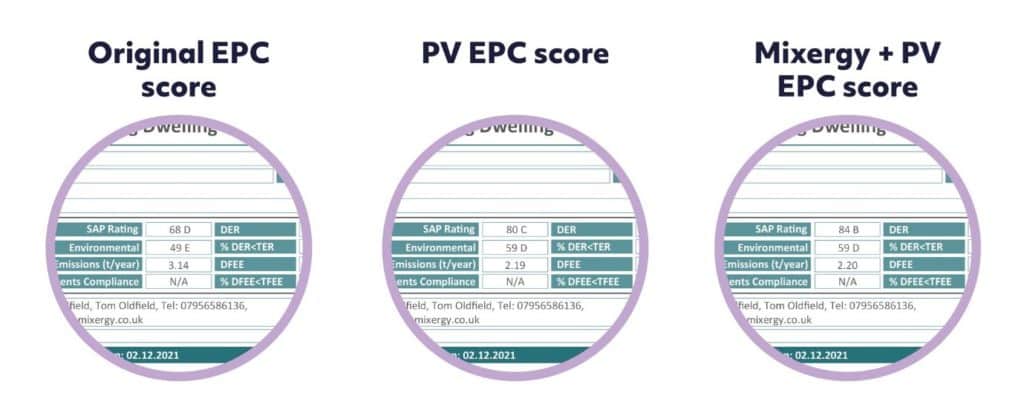
‘Net-Zero is a long and necessary journey and there are big gains to be made on reducing carbon emissions now with future-proof technologies like our smart hot water cylinders.’
Earlier this year, we were recognised in the building regulations in SAP and RdSAP under Appendix Q for Smart Hot Water Cylinders. The home in the example above has been taken from an EPC score of 68D, uplifted to 80C by adding solar PV, and taken to 84B by combining a Mixergy smart hot water tank with a solar PV diverter.
By utilising two low-cost and low-disruption for the tenant technologies, Mixergy and solar PV were able to save 453 KWh of electricity and have an impact on climate change now, rather than kicking the bucket down the road to Net-Zero electricity generation.
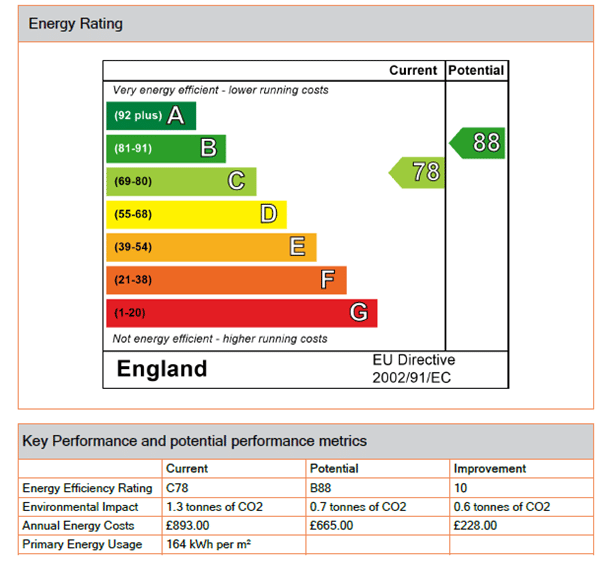
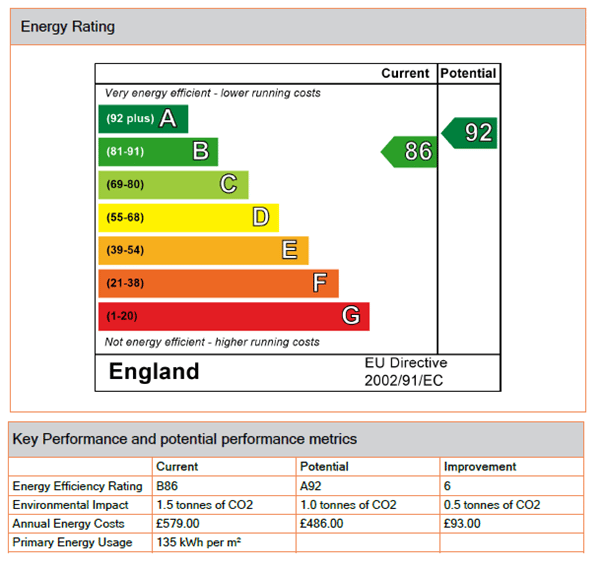
Our SAP assessor at Mixergy has been carrying out some internal modelling on new and past projects for the last few weeks. Mixergy was used as part of a heat pump installation with solar PV. The house was brought up to an EPC score of C78. Using Mixergy, the tenant benefits from a COP boost of up to 10% and further savings from our machine learning. What was really interesting was by removing the heat pump and replacing the original gas boiler back into the property, Mixergy with the same amount of solar PV was able to take boost the EPC score higher than a heat pump to a B86! This is where Social Housing providers can start to make real gains on their housing stock EPC requirements. Having technologies like Mixergy gives an improvement now to meet upcoming legislation such as an EPC C by 2030, offer real carbon savings and as the Mixergy smart hot water cylinder is heat pump ready, offer even greater carbon savings in the future when our electricity generation carbon intensity is reduced as we move closer to Net-Zero.
If you would like to find out more about how Mixergy can improve existing housing stock EPCs please drop an email to: james.hoople@mixergy.co.uk
A huge thank you to James and Mixology for such a brilliant and interesting piece.
Here at Buildpass, we love collaborating with leaders in the sustainable construction field. If you might be interested in writing a guest post, please drop us a line. We’d love to hear from you.



